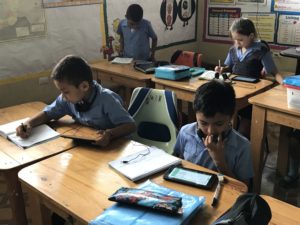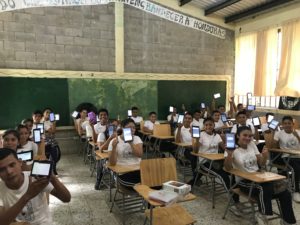This blog was originally posted on the learningequality.org website blog.
Shoulder to Shoulder’s education mission, CREE (Regional Center for Educational Excellence or Centro Regional para Exelencia en Educación) focuses on bringing high quality education to rural areas where access is extremely limited. KA Lite has been one of our main methods in connecting these disconnected communities to better STEM education. To paint a picture, we are working in Southern Intibucá with a total population of about 70,000. It is one of the poorest of the 18 “departments” (states) of Honduras. ShouldertoShoulder.org has been working here for over 25 years.
Currently, we have KA Lite deployed in three high schools and two grade schools, within three towns. There we have deployed a total of 7 servers and 230 tablets. In the high schools, we are covering math and science classes for the whole school. We are currently touching over 1,000 children, but teachers are still learning how to best use it. Slowly but surely, as our network is growing, word is spreading of this new method of learning and teaching. We have contacts and interest in many other towns and our expansion is ongoing. Our goal is to deploy KA Lite throughout all Intibucá over time, to about 15,000 students.

Paul and I (two CREE volunteers focused on KA Lite) are meeting with prospective educational leaders in neighboring towns. We leave each meeting so encouraged. We are working in a country where things move slowly – “Honduran Time” as we say – and many times promises to the poor never materialize. But those bus rides back from each town are filled with excitement-filled conversations, hope, and respect for the leaders that are so committed to bettering the education for their community. In the end, we are learning that taking our time and having patience is well worth it. Our mission is not to “give” and “bring” but to “train” and “form partners.” KA Lite is something to be integrated into the schools and for them to take ownership of – we are just here to light the fire a little.
Our last meeting was in a town called Santa Lucia where we met Luis Pineda – the educational coordinator for his district. After installing and then training the professors at the high school on KA Lite, Luis came to us with a humbling request. Each town has various “aldeas” or villages that pertain to it in the surrounding mountainside. Luis has a big heart for the villages, as he worked most of his life in one in a grade school. He was one of three teachers, collectively teaching grades 1-6…a very typical situation. Whereas I see a huge lack of access to resources in the towns I’m going to, he attempted to paint a picture of how much worse it was for the villages, without any cell service or power much of the time. Their resources are much scarcer. Above all, he wanted us to know that he doesn’t want them to remain forgotten. His request was that we try to bring KA Lite, the bare minimum we are able to, even if it just a server, to these communities as well.
Luis has the type of ideas and heart that will propel us forward. The best ideas come from the people themselves, right? We have been so focused on getting into the main schools in towns – and we still will, but we want to shoot for the stars and see every child here in Intibucá with access to a better education. Hombro a Hombro has been traditionally focused on health since its founding in 1990. Only in the last five years or so have we started to turn our focus on education as well. Education is opportunity, opportunity is hope, and hope is something that children here in Honduras are so desperate for.
Utilizing the KA Lite technology has given us a visible manifestation of the hope these students possess within themselves to succeed. In the high school in Camasca, Intibucá, the math teacher Daniel tells us about his students literally running to his class to get their tablets. One boy broke a chair mid-run a few weeks back and now unfortunately has a fine to pay. In the Magdalena high school, the teachers set benchmark goals for the amount of points earned in KA Lite by each student per quarter. There are a few kids that have more than tripled the point requirement by coming in to school early or staying after class to work ahead. Extra time at school is a huge sacrifice to many of these kids as their walks home can be hours in the mountain – yet to them it is worth it.
themselves to succeed. In the high school in Camasca, Intibucá, the math teacher Daniel tells us about his students literally running to his class to get their tablets. One boy broke a chair mid-run a few weeks back and now unfortunately has a fine to pay. In the Magdalena high school, the teachers set benchmark goals for the amount of points earned in KA Lite by each student per quarter. There are a few kids that have more than tripled the point requirement by coming in to school early or staying after class to work ahead. Extra time at school is a huge sacrifice to many of these kids as their walks home can be hours in the mountain – yet to them it is worth it.
I will never get tired of watching kids light up when it’s “KA Lite time” or training eager teachers how to use this technology in their classrooms. Keep updated on our website or follow us on the KA Lite deployment map to see how we progress and expand in the coming months and year.
